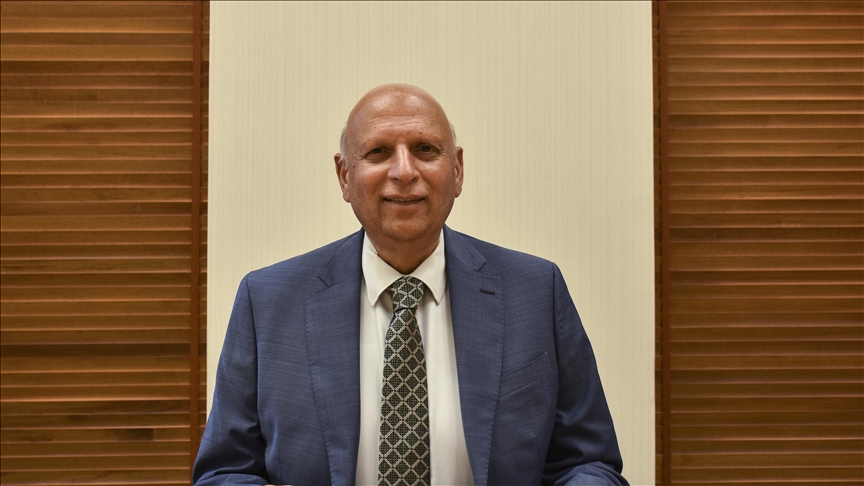Anadolu Agency speaks to Chaudhry Mohammad Sarwar, governor of Pakistan’s largest province Punjab.
ISTANBUL (AA) – Learning from our past will help further strengthen historical ties with Turkey, a top Pakistani official has said.
Chaudhry Mohammad Sarwar, the governor of Pakistan’s largest province Punjab, spoke to Anadolu Agency on the sidelines of the Bosphorus Summit in Istanbul, a two-day event held under the theme of “Challenges for a Better World,” with top officials, experts, academics in attendance.
Referring to the support of South Asian Muslims to the Ottoman Empire in the early 20th century, he said: “It is important that whatever has happened in the past, we remember that, and we educate our next generation.”
“There should be some kind of memorial on the contribution of South Asian Muslims during Turkey’s War of Independence,” he said, offering to build one in Lahore.
The governor added: “Our support for Turkey continues to this day … When you were fighting for democracy in Turkey [during the failed 2016 coup], the people of Pakistan supported Turkey’s democratic institutions and the democratic government.”
– Possible collaboration with Turkish aid agencies
Praising the efforts of Turkish aid agencies such as TIKA and Humanitarian Relief Foundation (IHH) in Pakistan, Sarwar said “it is a great idea” to collaborate for joint projects.
He said he pooled together a network of non-governmental organizations (NGOs) in Punjab, which proved helpful during the COVID-19 pandemic. “I brought them together, who then launched an umbrella organization, the Punjab Development Network (PDN),” he said.
The PDN currently has 191 members, working in different sectors including health, education, providing clean drinking water and sports.
“During the pandemic, we distributed two million ration packs to people who lost their jobs, who are on daily wages, so they could continue to survive during this difficult time,” he said.
“During the [2005] earthquake and during the 2010 floods [in Pakistan], I know there were a lot of NGOs from Turkey” which contributed to the relief efforts.
About preserving heritage in Pakistan, Sarwar said his office is preparing a list of all minority religious places in Punjab for possible renovation.
Sarwar said city-to-city collaborations from different countries has helped Pakistan.
Such collaborations bring expertise, experience, technology and know-how, he explained, referring to his efforts to twin the city of Glasgow, where he has served as a lawmaker, with Lahore.
He said such initiatives with the administration in Istanbul would also be helpful and “we will support it.”
– Education and clean water focus in Punjab
As the chancellor of all public and private sector universities in Punjab, Sarwar said his priority is “to bring meritocracy and get the best vice-chancellors appointed.”
“I wanted to change the practice ad hocism, but it was a hard, difficult job … I’m glad that now in all the universities in Punjab we have permanent vice-chancellors and I have appointed every vice-chancellor on merit,” he said.
Sarwar claimed the move produced results and universities from his province “are among the top 500” in international rankings.
“My number two challenge was providing clean drinking water,” he said. “We established the Punjab Aab-e-Pak Authority, and hopefully, with the cooperation of NGOs and generous people, we will provide 15 million people with clean drinking water in the next three months.”
Besides, he said the provincial government is working to issue health cards to all citizens.
– Pakistan wants peace, good relations with all neighbors
Sarwar said Pakistan “wants to have good relations with all neighbors.”
“When Imran Khan was elected as the prime minister, he made it clear that if they [the country’s neighbors] come one step towards us, we will move two steps for the friendship,” he said. “But unfortunately, [Indian Prime Minister] Narendra Modi did not respond positively.”
On Pakistan’s hope that relations could improve during Modi’s second tenure, he said many thought that Modi’s anti-Pakistan rhetoric will wither away, but “unfortunately, we were proved wrong.”
“What they did is unilaterally change the special status of Kashmir, abolishing Article 35A and Article 370, which was not acceptable to the people of Kashmir, and there have been gross violations of human rights, fake encounters, people being tortured,” he said.
He said all Pakistan wants is that “Kashmiris should be given the right to self-determination, and we should resolve our outstanding issues through dialogue and negotiation.”
Sarwar said if there is trade between Pakistan and India, “it is going to benefit our two countries.”
“We should know that our enemy is poverty… Our enemy is unemployment and illiteracy. People are living below the poverty line,” he said.
He said if the issue of Kashmir “can be resolved, both countries can live in peace side by side as we had lived centuries together before the independence of Pakistan and India” in 1947.
“We need to have dialogue and Narendra Modi has to change his policy, which is to victimize the Muslims living within India … They have to protect the minorities in India,” he asserted.
Calling the opening of the Kartarpur Corridor a “brave decision by Prime Minister Imran Khan,” he said: “We know it and the Sikh community knows it that Indians were very reluctant to open this corridor.”
“They tried to build barriers, hurdles so we can’t open the Kartarpur Corridor. But we were determined and committed to open the corridor,” he said, referring to a special pathway built between Pakistan and India in Punjab province that allows the Sikh community to visit their holy place in Pakistan.

